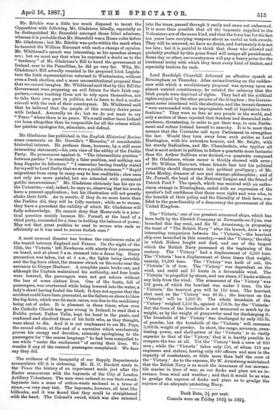The Victoria,' one of our greatest armoured ships, which has
been built by the Elswick Company at Newcastle-on-Tyne, was launched this day week, and Sir W. Armstrong, in proposing the toast of " The British Navy " after the launch, drew a very interesting comparison between the Victoria,'—the heaviest ship ever launched in this country,—and the' Victory,' the ship in which Nelson fought and died, and one of the largest which the British Navy possessed at the beginning of the century. The Victory' had a displacement of 3,500 tons. The Victoria' has a displacement of three times that weight, namely, 10,500 tons. The Victory' was built of oak, the Victoria' is of iron. The ' Victory' was dependent on the wind, and could sail 13 knots in a favourable wind. The Victoria' is propelled by steam, and can steam 17 knots without any help from the wind. The armament of the' Victory' was 102 guns, of which the heaviest was under 3 tone. On the Victoria' the heaviest gun will be 110 tons. The heaviest shot used on the Victory' was 68 lb. ; the heaviest on the Victoria' will be 1,800 lb. The whole broadside of the Victory' weighed 1,150 lb., against 4,750 lb. for the Victoria.' But the force of the broadside is not measured so much by its weight, as by the weight of gunpowder used for discharging it. The broadside of the' Victory' was discharged by only 325 lb. of powder, but the broadside of the ' Victoria' will consume 3,000 lb. weight of powder. In short, the range, accuracy, pene- trating power, and shell-power of the ' Victoria' is so vastly superior to that of the Victory,' that it is hardly possible to compare the two at all. Yet the' Victory' took a crew of 850 men ; while the ' Victoria ' takes only 550, of whom 110 are engineers and stokers, leaving only 440 officers and men in the capacity of combatants, or little more than half the crew of the Victory.' As to the expense, Sir W. Armstrong maintained that the British Navy is as much the insurance of our mercan- tile marine in time of war, as our docks and piers are an in- surance from wind and weather ; and that it would be as wise to grudge the expense of docks and piers as to grudge the expense of an adequate protecting Navy.


































 Previous page
Previous page